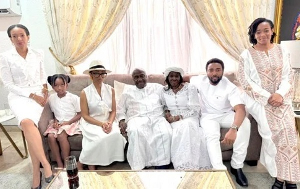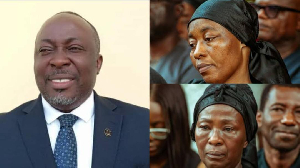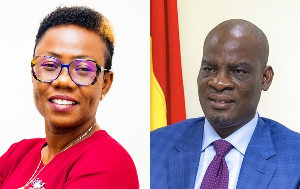Manasseh's Folder: Do our lecturers deserve research allowance? A rejoinder.
Jasper Abembia Ayelazuno
Ghanaian lecturers need to pay attention to these serious charges made against them by Mr Awuni. From the online comments on the piece, it seems his views are congruent with those of most of the readers, and he is getting three cheers for expressing them. It may be true that some lecturers are guilty of his charges. For example, the allegation of plagiarism is well-founded. To prepare handouts for students, using ideas from original sources and passing them off as one’s own is plain plagiarism. It is even more serious, indeed, vulgar, if one profits monetarily from this act. It is called stealing, period!
However, the author should have exercised some bit of caution in making some of his charges. Most of them are based on mere speculation and his limited academic experience in the field he studied, Communication Studies. The author is certainly conscious of his unfounded allegations and reckless, sweeping generalisations; but he insists on making them. One wonders why. He writes: “About 95% of you cannot justify why you should be paid research and book allowance. Don’t ask me the source of my percentage, because if you took time to research on this subject you would leave the impoverished national purse alone after getting your arrears”. Wow! About 95% of his lecturers in Communication Studies do not do research? Serious stuff!
Perhaps, this may be out of the hubris of a journalist with privileged access to a worldwide medium of expressing his views, however unsubstantiated they are. Be that as it may, these privileges should be exercised with caution, particularly if one is questioning the integrity of another person or a group of people; if even that person is a convicted felon.
For one thing, the author may come across as courageous, but the reality is that criticisms and allegations are easy to make, particularly if the accuser has the platform to do so without any quality controls.
Scholarly writing may be different from journalism. This piece seems to demonstrate that, whereas polemics and rhetoric may be welcome in journalism, they are clear markers of sleazy scholarship in the social sciences.
In an academic context like the universities, this piece would have hit the dustbin straight away, if it were submitted for publication in a journal. Not even an undergrad student can get away presenting a paper like this in a seminar attended by her colleagues. Indeed, if a student presents a paper like this in any of the social sciences, it will not pass, because most of the arguments are based on emotional speculations rather than logical arguments backed by verifiable evidence.
The fact is there are many great Ghanaian scholars, based both in Ghanaian and foreign universities who have written groundbreaking monographs, edited volumes, and journal articles on Ghana. I can mention off the top of my head female scholars like Profs Takyiwaa Manuh and Akosua Adomako Ampofo; for political science, Profs Ayee, Ninsin, Maxwell Owusu and Gyimah-Boadi; for political economy, Prof Aryeetey; and for sociology Profs Nunkunya, Assimeng, Abochie, Tonah, and Dzorbo.
The author should have taken the pains to research and mention some of these scholars. One only needs to visit the University of Ghana bookshop and do a casual survey of the titles on display to see this. With the reckless generalisation of Mr Awuni, all these scholars (and other hardworking ones) will walk into the lecture halls as lazy, incompetent teachers to those students who have read his piece. But Awuni has his reputation intact. Hmmmmmm, perhaps, the lecturers should leave the lecture halls and join the noble, powerful, inky fraternity.
Moreover, Mr Awuni should have been courageous enough to mention some of the lecturers who are not doing research, yet benefit from the research allowance. This is a serious issue that cannot be discussed in a worldwide medium without compelling evidence. At the very least, an effort should have been made to provide some sort of evidence. By the way, one is left wondering where Mr Awuni was trained, a training that has made him such a brilliant journalist. Ah well, he says he was trained in Ghana. Under those poor academic conditions he has described? If even this is the case, at least, one or two of his lecturers might have been good teachers and contributed to his knowledge and technical expertise in journalism. This should have been an opportunity to acknowledge them. None at all?
Mr Awuni may be forgiven because some of his claims may be based on ignorance of university teaching. For example, there is nothing wrong assigning readings authored by Western scholars on Ghana or asking students to apply knowledge produced in a different social context to Ghana. It often depends on the discipline, course, and pedagogical approach of the lecturer. However, in most cases, especially in the social sciences, it is part of the training of students in critical analysis that they should be taught to analyse issues both contextually and comparatively.
There is also nothing wrong publishing in foreign journals, most of which are not accessible to Ghanaian students; and certainly, it is an acceptable practice to publish for promotion. Every scholar wants to, and should, publish in the top tier journals which can be accessed by subscription. If Ghanaian universities do not subscribe to these quality journals, then this is a problem far more complex than Mr Awuni understands it.
Quality university education depends on access to the state of the art knowledge in the world. If Ghana is serious with university education, it should spend money on access to knowledge; and this includes paying subscription fees for students and faculty to gain access to top tier journals. If Mr Awuni had access to these journals, he would have found out that many Ghanaian lecturers are researching and publishing on Ghana.
Mr Awuni is certainly making his mark in Ghanaian journalism, and he deserves most of the acclaims and glorification he is getting. Alas, there is the danger of hubris, or even narcissism, lurking in the shadows of his fame. He has literally called the credibility of 95% of Ghanaian lecturers, retired and active, into question without providing a shred of evidence to support his serious allegations. What else to attribute this breathtaking courage?
Perhaps, the humility of excellent journalists like George Sydney Abugri should serve as the lodestar to young journalist such as Mr Awuni. The power of the keyboard (for pen) and the worldwide web must be used judiciously; else, like politicians, many good journalists can abuse their power and fame, making their victims to suffer humiliation unnecessarily.
Opinions of Saturday, 3 August 2013
Columnist: Ayelazuno, Jasper Abembia














